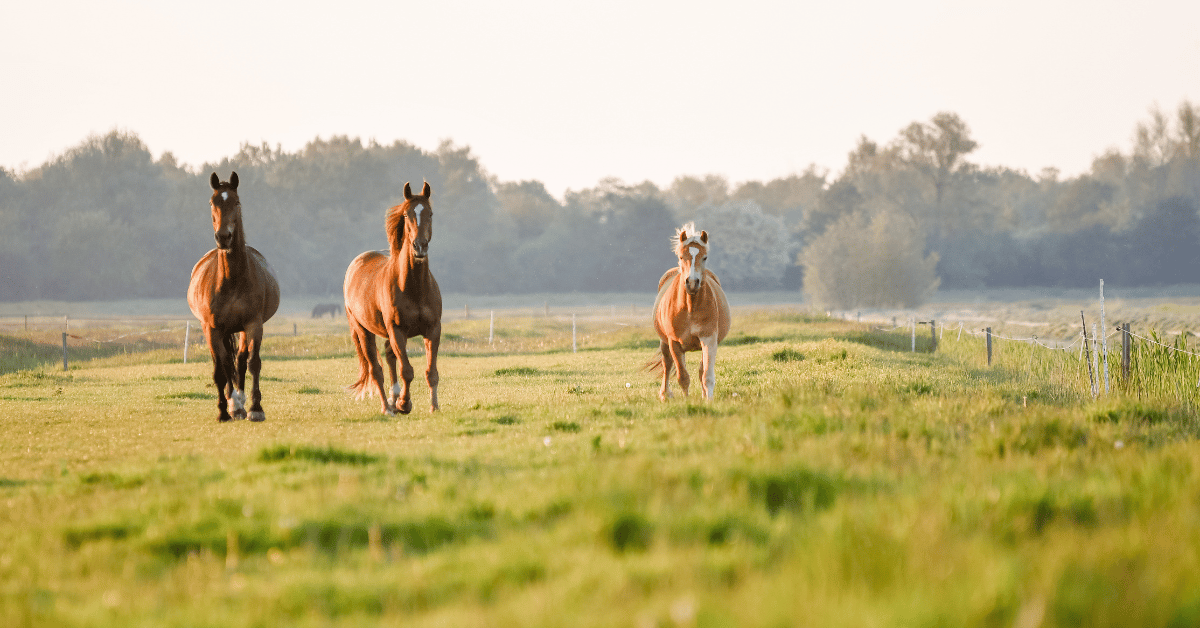Is it Good to Give a Horse a Holiday?
Many people occasionally give their horse time off—during winter, bad weather, or when they themselves go on vacation. But is it actually a good idea? When is it suitable to give your horse a break, when is it not, and what should such a holiday look like?
Others
Welfare

13 November '25 • 4 min reading time
The short answer: It depends on the horse. Every horse is different, and it’s always a matter of individual needs. Here are some things to consider if you’re thinking about giving your horse a break.
Mental Balance
Horses are creatures of habit and herd animals. Changes in daily routine can cause stress, especially in nervous or inexperienced horses. If your horse is mentally sensitive, it may be best to keep its routine as normal as possible while you’re away, particularly for horses that spend most of their time in the stable. Horses with plenty of free movement and social contact are likely less affected by changes in schedule. Research shows that young horses new to training experience less stress if they also have free movement and companionship. So, horses that live a “rich horse life” with friends in the pasture or paddock are usually less affected by a short break from training.
Time Off in the Pasture
It’s common to let young horses that have gone through an initial training period spend a few months simply being horses in the pasture. This can be beneficial, allowing them to process what they’ve learned. However, some horses—especially hot-blooded ones—may not enjoy this and can become wild or difficult to handle if left unattended for weeks or months. Always consider your horse’s temperament.
Physical Aspects
There is more research on the physical effects of rest than on mental aspects, though studies are still limited. Training works on cardiovascular fitness, suppleness, and muscle strength. Rest is equally important—this is when the body recovers and adapts to a slightly higher level than before, known as supercompensation. Adequate rest, combined with the right training intensity, prevents overtraining while promoting progress. Too much rest or insufficient training will slow improvement. Dutch scientist Carolien Munsters has researched these principles extensively using heart rate monitors and lactate measurements.
Short Holidays Have Little Effect
Most horses do not lose much fitness after a week or two off. Training can often resume smoothly without significant loss of strength or endurance. Research supports that horses given a short break with light activity do not lose cardiovascular condition. However, longer breaks will eventually reduce muscle tone and fitness, and recovery time varies by breed and individual. For example, Friesian horses generally require more recovery and lighter training than Dutch Warmbloods after rest.
Free Movement is Essential
Free movement and social contact are vital not only for mental balance but also for physical condition. Young horses kept outdoors in groups adapt better to training than those mostly kept in stalls. Therefore, holidays are less impactful for horses with lots of social interaction and movement. Older horses are more affected by breaks; for seniors, “rust can cause rust,” and rebuilding fitness takes longer.
Conclusion: Sometimes Beneficial, But Not Necessary
If your horse is mentally stable, a short holiday usually won’t harm it. Ensure your horse has plenty of free movement and social contact during its break. For older or stress-prone horses, light riding or lunging by a stablemate or family member is recommended while you’re away. If the other 23 hours of the day are well-managed, your horse may not even notice its holiday.
Sources
Introductie over het onderzoek van Carolien Munsters: https://www.uu.nl/achtergrond/verrassend-dat-een-kleine-aanpassing-zon-groot-effect-kan-hebben
E. Rivera, S. Benjamin, B. Nielsen, J. Shelle, A.J. Zanella, Behavioral and physiological responses of horses to initial training: the comparison between pastured versus stalled horses. Applied Animal Behaviour Science, Volume 78, Issues 2–4, 2002, Pages 235-252, ISSN 0168-1591,https://doi.org/10.1016/S0168-1591(02)00091-6. https://www.sciencedirect.com/science/article/pii/S0168159102000916
Federico M. Boffi, Arno Lindner, Ramón A. Lopez, Veronica Botta, Sebastian Sadaba, Marcos Muriel, Effect of Recovery Periods during Conditioning of Horses on Fitness Parameters, Journal of Equine Veterinary Science, Volume 31, Issue 11, 2011,Pages 661-666, ISSN 0737-0806, https://doi.org/10.1016/j.jevs.2011.05.005. https://www.sciencedirect.com/science/article/abs/pii/S0737080611003558
Cristina Castejon-Riber, Cristina Riber, María Dolores Rubio, Estrella Agüera, Ana Muñoz. Objectives, Principles, and Methods of Strength Training for Horses. Journal of Equine Veterinary Science, Volume 56, 2017, Pages 93-103, ISSN 0737-0806, ttps://doi.org/10.1016/j.jevs.2017.04.011. https://www.sciencedirect.com/science/article/abs/pii/S0737080616307158
Wonghanchao, T.; Sanigavatee, K.; Poochipakorn, C.; Huangsaksri, O.; Chanda, M. Dynamic Adaptation of Heart Rate and Autonomic Regulation During Training and Recovery Periods in Response to a 12-Week Structured Exercise Programme in Untrained Adult and Geriatric Horses. Animals 2025, 15, 1122. https://doi.org/10.3390/ani15081122 https://www.mdpi.com/2076-2615/15/8/1122
BIRGITTA ESSÉN-GUSTAVSSON, D. McMIKEN, K. KARLSTRÖM, A. LINDHOLM, S. PERSSON, J. THORNTON. Muscular adaptation of horses during intensive training and detraining. January 1989 https://doi.org/10.1111/j.2042-3306.1989.tb02085.x https://beva.onlinelibrary.wiley.com/doi/abs/10.1111/j.2042-3306.1989.tb02085.x


